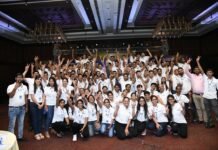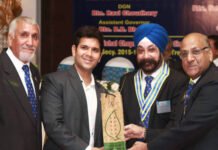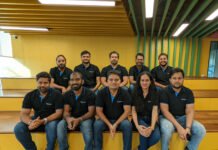We are publishing an interview of Ms. Aishwarya Singh, Coordinator of the Legal Entrepreneurship Cell (LEC), Jindal Global Law School, Sonipat, Haryana.
Please tell us about the founders
The LEC was founded in February, 2016 by Suprotik Das & Mishaal Nathani, under the aegis of the Jindal Centre for Social Innovation and Entrepreneurship, O.P. Jindal Global University. At present, the activities of the LEC are being coordinated by Aishwarya Singh, Saamir Prabhakar Raketla and Mishaal Nathani.
Suprotik & Mishaal had always been interested in the confluence of law and business. Added to this, with the advent of the Start-Up India Action Plan in the year 2015, the demand for pre-incubation and incorporation advisor was on the steady rise. Running parallel to this, various centres in our university, from the business school to the liberal arts school, were in the process of incubating several start-ups out of the Delhi-NCR region and were also playing host to a number of entrepreneurs who needed holistic business solutions. This led to the inception of the LEC, a pro bono consulting practice, which consisted of students from second to fifth year of Jindal Global Law School.The LEC presented to us, as law students, an opportunity to translate theoretical knowledge into practice. Since, then we have been involved in providing tailored legal opinions and drafting agreements for start-ups, which are in need of legal solutions.
Suprotik has recently graduated and remain a source of constant support and guidance to the existing members of the LEC.

What is the problem you are trying to solve? Can you share with us any insights that led you to believe that this is a big enough problem?
The LEC is a pro bono initiative, aimed at providing holistic legal research solutions to early stage ventures, NGOs and individuals who typically cannot afford to hire legal services.
With increasing interest in the start-up ecosystem in India, many of our friends and family members started approaching us, as law students, with legal queries. These questions varied from incorporation of the business entity, licenses, tax related queries and the like. Added to this, we faced similar legal questions from the start-ups being incubated at Jindal Centre for Social Innvoation and Entrepreneurship in our University. We could see that there was an information gap between the legal system in place and the entrepreneurs. It also dawned upon us that for entrepreneurs and businessmen alike, the requirement is to have simple, uncomplicated and pragmatic legal solutions.We realized that a pro bono legal consulting practice was the need of the hour.
What is the uniqueness about this Legal Entrepreneurship Cell?
We would not categorize ourselves as a start-up but as a pro-bono initiative providing legal assistance to start-ups, early stage ventures and NGOs. Lawyers are expensive, and for many young entrepreneurs pro-bono legal assistance is the only solution.

Our strength lies in providing tailor-made legal research notes spanning a breadth of practice areas (corporate, commercial, foreign exchange, tax, etc.) and drafting various contract templates (commercial contracts, employment contracts, miscellaneous agreements). We have been functioning quite effectively over the past year and have dealt with many interesting and challenging legal issues concerning numerous start-ups and NGOs. We seek to deliver law firm quality work and follow bar council ethical guidelines.
Another asset that we have is our diversified and experienced faculty. Our faculty advisors are qualified lawyers with deep domain knowledge across a wide range of practice areas. The LEC ropes in faculty members if required to solve the legal queries presented by our clients.
What is the revenue model? What is the logic behind it? What is the model you are following – Free / Freemium / Premium etc. ? Explain your thought process.
As of now, the LEC is a pro-bono initiative. We are using the resources available in the University. We believe that legal woes should not be a hindrance to entrepreneurship. We seek to empower entrepreneurs by providing free legal assistance and simultaneously improve our skill set as budding legal professionals.
Who are the consumers that you are targeting? How is this going to affect them?
We are targeting early stage ventures, start-ups, NGOs and individuals who typically cannot afford to hire legal services. Since we are providing pro-bono services, many young entrepreneurs around the NCR-Region have approached us. We have been engaged in helping Tibetan refugees in launching their start-ups in the NCR-Region. We hope that our initiative will have a positive effect on the Indian start-up ecosystem as there are not many pro-bono legal initiatives in the area of transaction advisory law.
What is the big picture of your Legal Entrepreneurship Cell? Will it lead to something bigger? If so, how?
The long term goal of the LEC is to provide law firm-quality work and build expertise in the legal issues involved in starting up, growing a business and running of NGOs. At the same time expanding the LEC to function on a Pan-India basis is essential. We seek to partner with other law and business schools in India so that we can collaborate and elicit business solutions on a pro-bono basis to startups and NGOs around India. We are also looking for possible collaborations with start-up incubators.

What is the success story of Legal Entrepreneurship Cell in your own words?
On boarding clients was a difficult task since there were apprehensions regarding the quality of work law students can deliver. However, we are happy to note that we have been able to retain the clients that we have worked for previously by providing quality work under strict timelines. Though expanding our network of clients still remains a challenge, since last year we have successfully completed, inter alia, the following tasks:
- Drafting of templates for employment and independent contractor
agreements. - Drafting of terms and conditions and privacy policy for a technology start-up.
- Drafting of a guidance note dealing with the tax benefits under the Start-up India Action plan
- Drafting of partnership deeds.
- Drafting of research notes spanning subject matters like Foreign Exchange
Laws, Competition Law, Intellectual Property, Taxation, Company Law. - Business advisory for Tibetan refugees who plan on opening up shops in and
around Delhi NCR.
We hope to continue expanding our network and make our contribution to supporting innovation, social change and entrepreneurship.
Thanks Aishwarya. Best wishes from our team.


![How This Jaipur-Based Agritech Startup is Bridging the Gap with Innovative Farming Tools [ L to R ] - Shubham Bajaj and Rohit Bajaj, Co Founders - Balwaan Krishi](https://startupsuccessstories.in/wp-content/uploads/2024/10/L-to-R-Shubham-Bajaj-and-Rohit-Bajaj-Co-Founders-Balwaan-Krishi-218x150.jpeg)



